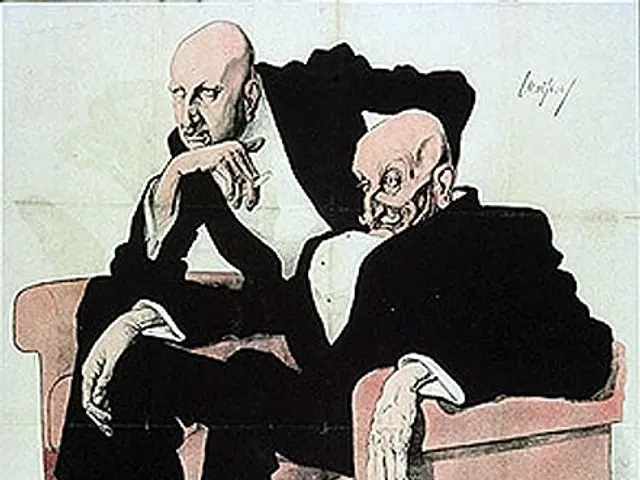Sliding Towards Autocracy: An Analysis of President Trump's Administration
Slide towards authoritarian rule in the U.S. – the extent of the drift?
The United States finds itself in a precarious position under President Trump's leadership, with concerns about autocratic tendencies on the rise. Researchers and experts are sounding the alarm bells, warning of democratic backsliding.
Every corner of the political spectrum echoes the same sentiment: the U.S., once a beacon of democracy, is now undermining its own political system. Trump's administration is weakening democracy with executive orders, public defamations, and relentless pursuit of personal political goals.
The question on everyone's mind is: Are we already an autocracy? Though it's challenging to keep pace with everything the U.S. government is doing, the destructive actions from the initial months are leaving a lasting impact.
Trump's Assault on Democracy
Trump has wielded his power like a sledgehammer, destroying the pillars of democracy: separation of powers, equality before the law, freedom of speech, and free press. He has interfered in education, research, and culture. For Trump and his allies, the only definitive limit seems to be the rulings of the Supreme Court.
The agencies and education institutions are no exception. Internal anti-corruption controls have been scrapped, equal opportunity measures cast aside due to allegations of reverse racism. Unfortunately, schools and universities alike are suffering the consequences.
USA: A Step Toward Competitive Autocracy
In a survey of the political system in the U.S., the country has fallen from 67 to 49 under researchers after Trump's first 100 days. This is the lowest score since the survey began in 2017. Even during the first term and following the attempted coup on January 6, 2021, the value did not dip below 60.
The researchers examine 30 indicators for their assessment, evaluating factors such as government interference in press affairs, political reprisals, and limitations on government power by Congress and the courts. On this scale, the U.S. is closer to a dictatorship than its neighbor Mexico, but still further away than Hungary.
The U.S. is walking a fine line between a perfect democracy and a pure dictatorship. It falls into the category of a competitive autocracy, characterized by elections taking place and democratic institutions persisting, but being misused to maintain power.
Musk and thetechnocracy
Shortly after Trump's inauguration, historian Timothy Snyder argued that it was already a coup. He discussed the influence of tech billionaire Elon Musk and his employees, often referred to as the "Ministry of Government Efficiency," who gained access to U.S. ministries and sensitive databases.
Musk's involvement in government is a cause for concern. He was not elected and had no authorization to wield the power he held. He has since retracted from his daily work for the government, but the consequences of his actions may linger throughout Trump's presidency.
Changes already made may persist despite legal challenges. The U.S. court system is currently a primary resistance force, but constant legal defense is expensive. A frivolous lawsuit threat alone can break resistance.
To Autocracy or Back?
Trump has signed only a handful of laws during his first months in office due to his party's lack of majorities in Congress. However, his administration has relied heavily on executive orders, which can be reversed by any subsequent government without additional majorities.
The future is uncertain, but Trump's administration has already caused significant damage to democracy. He has attempted to operate without the checks and balances put in place by the founders of the United States to prevent autocratic rule.
Trump's actions have been characterized as the most harmful to democracy since the end of Reconstruction, a period following the end of the Civil War in 1865. The potential for future heads of state to repeat his actions is a concerning thought, raising questions about the future of the U.S. democratic system.
Source: ntv.de
- Donald Trump
- USA
Enrichment Data:
Overall:
The current state of democracy in the United States under President Trump is a subject of significant debate and concern among researchers and experts. Here are some key points:
Overview of Concerns
- Authoritarian Tendencies and Democratic Backsliding: Trump's actions have been described as authoritarian, contributing to democratic backsliding. His administration's extensive use of executive orders and targeting of political opponents have raised legal challenges, with over 220 lawsuits filed against his policies[1].
- Legal Challenges and Indictments: Trump became the first U.S. president convicted of a felony in 2024. Despite this, he won the 2024 election and was sentenced to a penalty-free discharge, with two felony indictments against him dismissed[1].
- Regulatory Changes: During his second term, Trump's administration has continued to pursue deregulatory policies, affecting areas like the environment, health, and labor. This has been tracked by organizations like the Brookings Institution, which monitors significant regulatory changes[3].
Expert Analysis
- Comparative Analysis: Experts have been analyzing the first 100 days of Trump's second term in historical context, comparing his policies with those of past presidents. This includes discussions on the implications for U.S. democracy and foreign policy[5].
- Impact on Civil Society: Trump's policies have led to significant conflicts with civil society and have been criticized for their impact on political discourse. His actions have been characterized as divisive and have been associated with false and misleading statements[1].
- The European Union is closely monitoring the political situation in the United States, as concerns about autocratic tendencies under President Trump's leadership have raised alarms.
- In the context of war-and-conflicts, politics, and general-news, Whatsapp messages among government officials and tech billionaires like Elon Musk have started to surface, causing concerns about potential interference in U.S. politics and democracy.
- As the United States continues to grapple with questions about its democratic integrity, many experts agree that the country's democratic immunity has been weakened, leaving it more susceptible to autocracy.
- In an effort to address these concerns, there have been discussions among political leaders in the European Union about agreeing on joint measures to support and protect democracies around the world, including the United States.






